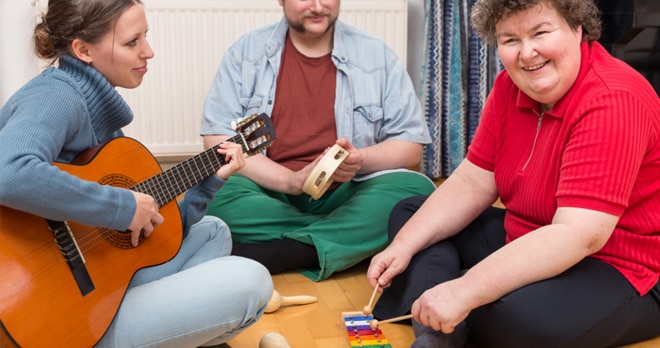Can listening to music really make a difference to stroke survivors?

As a musician myself, there is nothing better than playing (or listening!) to your favourite piece of music. There is a certain calming feeling about hearing the familiar notes and rhythmic beat. It therefore comes as no surprise to me to learn that music therapy is being used as a rehabilitation tool to help stroke patients improve lost functioning such as movement, speech, cognition and mood. I was intrigued to know more about this and the potential benefits it could have.
It is a long accepted theory that music has many positive effects on a person lifestyle, health and general well being. A research paper published in 2000 entitled “Effect of music therapy on mood and social interaction among individuals with acute traumatic brain injury and stroke” investigated music therapy as a technique for improving the lives of people who had suffered serious injuries. 18 participants were randomly assigned either standard rehabilitation or standard rehabilitation combined with music therapy. Family members reported a significant improvement in those who had undergone music therapy. I know what a piece of music is, but what exactly does “music therapy” entail, why does it have such a profound impact and how can we put this to use in real life?
What is music therapy?
Music therapy can be used in many different ways. A typical session would begin with an opening song designed to encourage participation. People may then play together as a ground and improvise with various percussion instruments. They may be asked to express how they are feeling using their instrument or work as a group with each person assigned a particular note or section of the music to play. I can imagine that being given a tambourine, maracas or xylophone reminds people of being at school with their friends enjoying playing in music lessons. Perhaps these comforting memories are one of the reasons why it can be so successful?
Why is it so valuable?
I think there are a number of possibilities why music has such a profound impact. One theory is because music is often filled with emotional associations which can provide an effective medium for evoking emotional responses. A second theory is that the rhythm and beat of music can alter physiological functioning such as heart rate, blood pressure and respiration. This in turn can help structure behavior. Finally, it is thought that music can provide a safe, familiar and non threatening forum for both the patient and therapist to interact. This can help a patient get the most out of their rehabilitation and encourage participation.
How can this help patients and those who have suffered brain injuries and stroke?
Patients who have suffered a severe brain injury or stroke can often be left feeling isolated, low in mood or depressed and as though they are having to start their lives all over again. This is devastating for both them and their families.
Music therapy should of course be used in combination with psychological and other physical therapies. However, introducing music to compliment these other therapies could allow patients to express themselves and in a fun and entertaining way, improve both their mood, relationships and social functioning and in turn could make a real difference in helping them on the road to recovery and independence.
My colleagues and I also act for a number of young children who suffered brain injury around the time of their birth, leaving them with lifelong physical and cognitive injuries. When we are investigating their needs as a result of their injuries it is often recommended that our young clients have access to music therapy instead of traditional ‘talking’ therapies. Due to their age and injuries, it can often be difficult for children to fully express their feelings just through talking whereas music therapy allows them greater freedom and can be very beneficial in helping them to manage frustrations surrounding their injuries and differences with their peers.
It has also been reported that music therapy can help patients having medical treatment by reducing anxiety and aiding recovery.
It seems therefore that music has a number of wide ranging benefits, and I will be following developments in this area with interest.